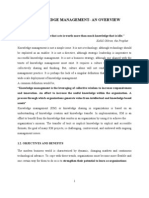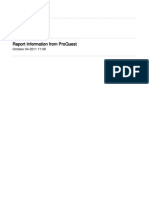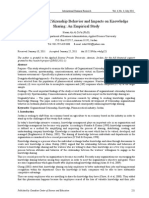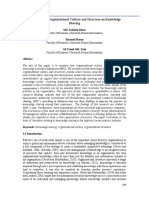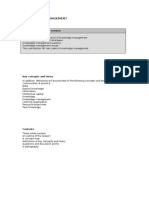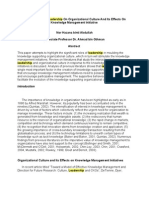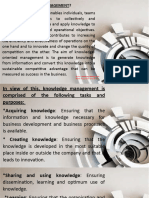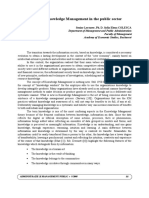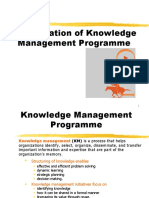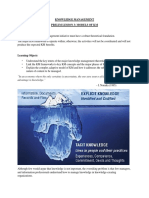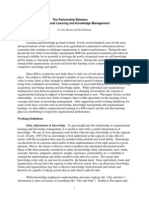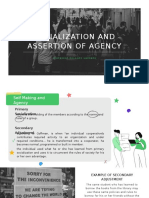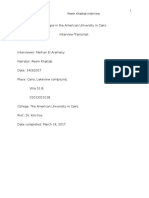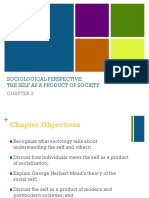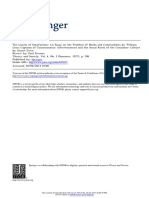Knowledge Management in Organizations
Challenges in Organizational Culture, Structure and Knowledge Transfer
KM and Organizational Culture
KM should be supported in a knowledge-sharing culture, and trust is its most important
component.
Dianne Ford (2001) summarized trust into interpersonal, group, organizational and
institutional targets
References:
Uriarte, F., Introduction to Knowledge Management (ASEAN Foundation
Ruggles, III, R., Knowledge Management Tools, Butterworth – Heinemman (1997)
�Knowledge Management and Organizational Structure
(Another issue regarding effective KM is organizational structure).
Knowledge Management and Organizational Structure
1. Major issues in organizational structure are interaction and strength on tacit knowledge.
2. Technology is only an enabler.
3. Organizational structure should align with the strategies and fit in a trust and open culture
environment.
4. Organizational structure should result in organization learning.
Challenges in Knowledge Transfer
Knowledge can be conceptualized as belonging to an employee rather than their employer
because the knowledge is fundamentally workers’ asset that they possess.
Tension between workers and the organization that they work for may inhibit the
willingness of workers to share their knowledge. (Hislop)
Tension relates not only to who “owns” an employees’ knowledge but how and for what
purpose such knowledge is used.
Being replaced by new employees can diminish ones ability to perform and hold power.
References:
Uriarte, F., Introduction to Knowledge Management (ASEAN Foundation
Ruggles, III, R., Knowledge Management Tools, Butterworth – Heinemman (1997)
�Challenges in Knowledge Transfer
1. Power
“The power exercised on the body is conceived not as property, but as strategy… this
power is exercised rather than possessed; it’s not the privilege, acquired or preserved,
of the dominant class, but the overall affect of its strategic positions −an effect that is
manifested and sometimes extended by the position of those who are dominated.”
(Foucault)
power is not only a discrete resource that social actors can utilize but it is something
that is produced and reproduced within and through dynamics of evolving relationships
(power is embedded in person)
2. Knowledge Sharing and Hoarding
Knowledge sharing can be time consuming and that there is a risk that individuals are
“giving away” a source of individual power and status
Another potential limitation for workers’ attitude towards knowledge sharing is affected
by over-rational view of how people think and act.
3. Commitment and Trust
communicating & clarifying expectations will explain workers what is wanted from them
and why decisions are made
employee participation in decision-making process provides premises for
psychological ownership where person feels that their effort and ideas are recognized
Interpersonal trust shapes people’s attitudes in knowledge sharing process since
generally proven the lower level of trust a person has in someone else, the less willing
they will be to share knowledge with them (Hislop).
4. Culture
Practice-based theory already made an assumption that cultural background affects
person’s ability to gain and understand knowledge.
willingness to share knowledge is shaped and influenced by people’s national cultural
characteristics
References:
Uriarte, F., Introduction to Knowledge Management (ASEAN Foundation
Ruggles, III, R., Knowledge Management Tools, Butterworth – Heinemman (1997)
� 5. Motivation and Incentives
knowledge sharing should be intrinsically rewarded (individual pays and team
rewards)
type of incentive could also increase the possibility that people are more like to share
their knowledge among team members
No matter which approach organization uses, it is important to have an equitable
reward or incentive system. (Rhodes)
… employees must also have a strong motivation to learn. (Wei-Lei)
References:
Uriarte, F., Introduction to Knowledge Management (ASEAN Foundation
Ruggles, III, R., Knowledge Management Tools, Butterworth – Heinemman (1997)




